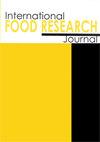标准食用燕窝提取物对人乳腺癌细胞系的化学预防和免疫佐剂特性
IF 1
4区 农林科学
Q4 FOOD SCIENCE & TECHNOLOGY
引用次数: 0
摘要
本文研究了食用燕窝提取物对乳腺癌细胞株MCF-7的化学预防和免疫佐剂作用。具体而言,通过测量EBN处理前后MCF-7、CD8+和CD14+细胞单培养和共培养中促凋亡和抗凋亡分子的产生,评估EBN提取物(HMG、EHMG、pHMG)对MCF-7、人免疫细胞(细胞毒性T细胞)和单核细胞(CD8+和CD14+)的细胞毒性水平。HMG对MCF-7的细胞毒作用最高,IC50为15µg/mL,但对CD8+和CD14+没有影响,细胞存活率超过90%。在mRNA水平上,HMG共培养后活化的CD8+和CD14+表达增加。此外,HMG处理通过下调MCF-7中抗凋亡基因的调控和上调促凋亡基因的调控来增加细胞凋亡。ELISA和多重检测显示,HMG处理后,在MCF-7单独或共培养中,非活化和活化的CD8+和CD14+均可增加促凋亡因子,降低抗凋亡可溶性因子。综上所述,HMG提取物具有免疫佐剂的特性,是一种潜在的抗癌药物,对人体免疫细胞没有任何有害影响。本文章由计算机程序翻译,如有差异,请以英文原文为准。
Chemopreventive and immunoadjuvant properties of standardised edible bird’s nest extract on human breast cancer cell line
The present work investigated the chemopreventive and immunoadjuvant properties of edible bird’s nest (EBN) extract on breast cancer cell line (MCF-7). Specifically, the cytotoxicity level of EBN extracts (HMG, EHMG, pHMG) against MCF-7, human immune cells of cytotoxic T cells, and monocytes (CD8+ and CD14+) were evaluated by measuring the production of pro-apoptotic and anti-apoptotic molecules released in single and co-culture of MCF-7, CD8+, and CD14+ cells, before and after EBN treatment. The highest cytotoxic effect towards MCF-7 using IC50 of 15 µg/mL was demonstrated by HMG but no effects on CD8+ and CD14+, with cell viability of more than 90%. At the mRNA level, activated CD8+ and CD14+ depicted increased pro-apoptotic gene expression after HMG treatment in co-culture. Additionally, HMG treatment increased apoptosis by down-regulating the regulation of anti-apoptotic genes and up-regulating the pro-apoptotic genes in MCF-7. ELISA and multiplex assay reflected increased pro-apoptotic factors, and decreased anti-apoptotic soluble factors, by non-activated and activated CD8+ and CD14+, in a single or co-culture with MCF-7 after HMG treatment. In conclusion, HMG extract possesses immunoadjuvant properties that can be a potential anticancer agent without causing any deleterious effects on the human immune cells.
求助全文
通过发布文献求助,成功后即可免费获取论文全文。
去求助
来源期刊

international food research journal
Agricultural and Biological Sciences-Food Science
CiteScore
1.40
自引率
0.00%
发文量
75
期刊介绍:
The International Food Research Journal (IFRJ) publishes papers in English, six (6) issues a year with the coverage of:
Food Science and Technology
Nutrition and Dietetics
Agriculture, multidisciplinary
Chemistry, multidisciplinary
The scope of the Journal includes:
Food Science, Food Technology and Food Biotechnology
Product Development and Sensory Evaluation
Food Habits, Nutrition, and Health
Food Safety and Quality
Food Chemistry, Food Microbiology, Food Analysis and Testing
Food Engineering
Food Packaging
Food Waste Management
Food Entrepreneur
Food Regulatory
Post-Harvest Food Management
Food Supply Chain Management
Halal Food and Management
 求助内容:
求助内容: 应助结果提醒方式:
应助结果提醒方式:


